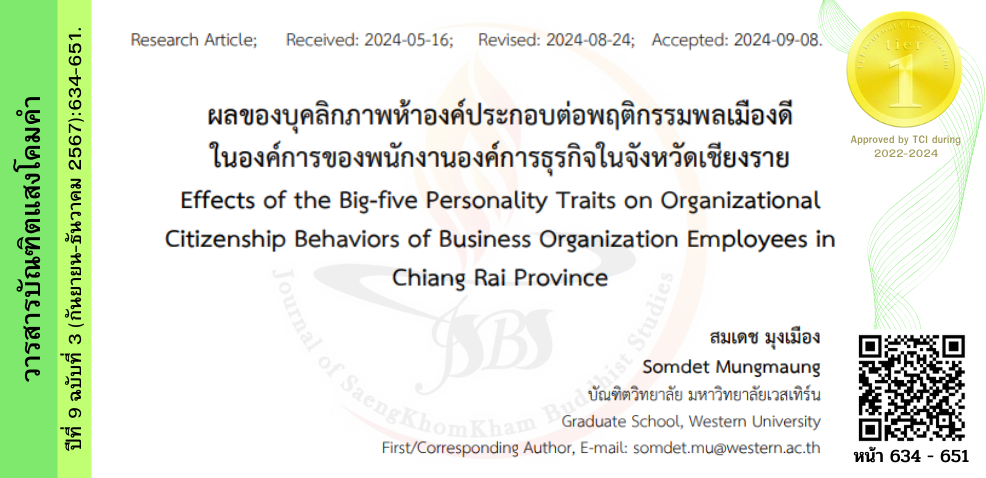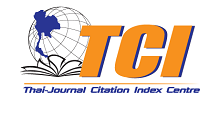ผลของบุคลิกภาพห้าองค์ประกอบต่อพฤติกรรมพลเมืองดีในองค์การของพนักงานองค์การธุรกิจในจังหวัดเชียงราย
คำสำคัญ:
บุคลิกภาพห้าองค์ประกอบ, พฤติกรรมพลเมืองดีในองค์การ, พนักงานองค์การธุรกิจบทคัดย่อ
บทความวิจัยครั้งนี้มีวัตถุประสงค์เพื่อศึกษาบุคลิกภาพห้าองค์ประกอบและพฤติกรรมพลเมืองดีในองค์การของพนักงานองค์การธุรกิจในจังหวัดเชียงราย และศึกษาผลของลักษณะบุคลิกภาพห้าองค์ประกอบที่มีต่อพฤติกรรมพลเมืองดีในองค์การของพนักงานองค์การธุรกิจในจังหวัดเชียงราย เป็นการวิจัยเชิงปริมาณ เก็บรวบรวมข้อมูลโดยใช้แบบสอบถาม กลุ่มตัวอย่างจำนวน 400 คน โดยสุ่มแบบเจาะจงจากพนักงานองค์การธุรกิจในจังหวัดเชียงราย วิเคราะห์ข้อมูลโดยใช้สถิติเชิงพรรณนา และสถิติเชิงอนุมาน ในการวิเคราะห์การถดถอดพหุคูณ
ผลการวิจัยพบว่า 1) พนักงานองค์การธุรกิจในจังหวัดเชียงรายมีบุคลิกภาพห้าองค์ประกอบ โดยรวมอยู่ในระดับมาก (=3.510; S.D.=0.464) โดยบุคลิกภาพแบบมีจิตสำนึกมีค่าเฉลี่ยสูงสุด ส่วนพฤติกรรมพลเมืองดีในองค์การ โดยรวมอยู่ในระดับมาก (
=3.793; S.D.=0.525) โดยพฤติกรรมด้านคำนึงถึงผู้อื่นมีค่าเฉลี่ยสูงสุด 2) บุคลิกภาพห้าองค์ประกอบ 4 แบบ ได้แก่ แบบมีจิตสำนึก แบบประนีประนอม แบบเปิดรับประสบการณ์ และแบบเปิดเผยแสดงตัว ส่งผลทางบวกต่อพฤติกรรมพลเมืองดีในองค์การอย่างมีนัยสำคัญทางสถิติที่ระดับ 0.01 สามารถทำนายพฤติกรรมได้ร้อยละ 36.8 (R2=0.368) ส่วนบุคลิกภาพแบบความมั่นคงทางอารมณ์ไม่มีผลต่อพฤติกรรมพลเมืองดีในองค์การ องค์ความรู้จากการวิจัย คือ ลักษณะบุคลิกภาพห้าองค์ประกอบมีบทบาทในการส่งเสริมและอำนวยให้เกิดพฤติกรรมพลเมืองดีในองค์การ ดังนั้น ผู้บริหารสามารถใช้เป็นประโยชน์ในการคัดเลือกและพัฒนาพนักงานให้มีบุคลิกภาพในระดับสูง เนื่องจากมีแนวโน้มที่จะมีพฤติกรรมพลเมืองดีในองค์การและมีส่วนช่วยให้องค์การมีประสิทธิผลมากขึ้น
Downloads
เอกสารอ้างอิง
ปกรณ์ ลิ้มโยธิน. (2558). พฤติกรรมการเป็นสมาชิกที่ดีขององค์กรในธุรกิจโรงแรม. วารสารหาดใหญ่วิชาการ. 13 (2), 155-165.
มาลิณี ศรีไมตรี และคณะ. (2562). อิทธิพลของภาวะผู้นำการเปลี่ยนแปลง วัฒนธรรมองค์การ ความพึงพอใจในการทำงาน ความผูกพันต่อองค์การที่ส่งผลต่อพฤติกรรมการเป็นสมาชิกที่ดีขององค์การของพนักงานในสถานประกอบการวิสาหกิจขนาดกลางและขนาดย่อม (ภาคการผลิต) เขตภาคตะวันออกเฉียง เหนือตอนล่าง 2. Journal of HR Intelligence. 14 (1), 45-67.
สมเดช มุงเมือง. (2567). อิทธิพลของภาวะผู้นำการเปลี่ยนแปลงที่มีต่อพฤติกรรมการเป็นสมาชิกที่ดีขององค์การของบุคลากรองค์กรปกครองส่วนท้องถิ่นโดยมีความพึงพอใจในงานเป็นตัวแปรคั่นกลาง. วารสารบัณฑิตแสงโคมคำ. 9 (1), 187-206.
สำนักงานประกันสังคมจังหวัดเชียงราย. (2565). ข้อมูลผู้ประกันตนตามมาตรา 33 (ลูกจ้างในสถานประกอบการในจังหวัดเชียงราย) ณ เดือนธันวาคม 2565. เชียงราย: สำนักงานประกันสังคมจังหวัดเชียงราย.
Alexandros, B. and Galanakis, M. (2023). The Big Five Model in Relation to Job Performance: A New Look at Organizational Psychology. Journal of Psychology Research. 13 (1), 1-8. DOI:10.17265/2159-5542/2023.01.001
Canales-Ronda, P. (2023). Relationship Marketing and the B2B Sales Force, Effects of Big Five Personality Traits. Journal of Relationship Marketing. 23 (2), 76–93. DOI:10.1080/15332667.202 3.2216372
Costa, P. T., Jr. and McCrae, R. R. (2014). The NEO Inventories. In Archer, R. P. and Smith, S. R. (eds.). Personality Assessment, 2nd ed. (pp. 229–260). Oxfordshire: Taylor & Francis Group.
George, D. and Mallery, P. (2003). SPSS for Windows Step by Step: A Simple Guide and Reference, 11.0 Update, 4th ed. Boston: Allyn & Bacon.
Hashim, A., et al. (2017). The Relationship between Big Five Personality and Organizational Citizenship Behavior. Proceeding of the 4th International Conference on Management and Muamalah 2017. Bangi, Selangor. pp. 320-340.
Hinkle, D. E., et al. (2003). Applied Statistics for the Behavioral Sciences, 5th ed. Boston: Houghton Mifflin.
Hopwood, C. J., et al. (2011). Genetic and Environmental Influences on Personality Trait Stability and Growth during the Transition to Adulthood: A Three-wave Longitudinal Study. Journal of Personality and Social Psychology. 100 (3), 545–556. DOI:10.1037/a0022409
Jan, M. F., et al. (2022). The Effect of Big Five Personality Traits on Leader Member Exchange and Organization Citizenship Behavior in Khyber Pakhtunkhwa Universities. Central European Management Journal. 30 (3). 131-155.
Kordsmeyer, T. L., et al. (2024). Longitudinal Effects of Employees’ Big Five Personality Traits on Internal Promotions Differentiated by Job Level in a Multinational Company. Journal of Business and Psychology. 1-17. DOI:10.1007/s10869-023-09930-7
Kreitner, R. and Kinicki, A. (2008). Organizational Behavior, 8th ed. Boston: McGraw-Hill.
Leephaijaroen, S. (2016). Effects of the Big-five Personality Traits and Organizational Commitments on Organizational Citizenship Behavior of Support Staff at Ubon Ratchathani Rajabhat University, Thailand. Kasetsart Journal of Social Sciences. 37 (2). 104-111.
Mubarok, Z., and Machali, I. (2023). Exploring the Interplay of Personality Dimensions and Organizational Culture on Organizational Citizenship Behavior. Manageria: Journal Manajemen Pendidikan Islam. 8 (1), 1-20. DOI:10.14421/manageria.2023.81-01
Oke, A., et al. (2009). The Influence of Leadership on Innovation Processes and Activities. Organizational Dynamics. 38 (1), 64-72. DOI:10.1016/j.orgdyn.2008.10.005
Organ, D. W. (1988). Organizational Citizenship Behavior: The Good Soldier Syndrome. Lexington, MA: D. C. Heath and Company.
Organ, D. W. (1991). The Applied Psychology of Work Behavior: A Book of Readings, 4th ed. Homewood, IL: Richard D. Irwin, Inc.
Organ, D. W. (2015). Organizational Citizenship Behavior. In Wright, J. D. (ed.). International Encyclopedia of the Social and Behavioral Sciences, 2nd ed. (pp. 317-321). Amsterdam: Elsevier. DOI:10.1016 /b978-0-08-097086-8.22031-x
Organ, D. W., et al. (2006). Organizational Citizenship Behavior: Its Nature, Antecedents, and Consequences. Thousand Oaks, CA: Sage Publications.
Pimentel, J. L. (2010). A Note on the Usage of Likert Scaling for Research Data Analysis. University of Southern Mindanao Research and Development Journal. 18 (2), 109-112.
Podsakoff, P. M., et al. (1990). Transformational Leader Behaviors and Their Effects on Followers' Trust in Leader, Satisfaction, and Organizational Citizenship Behaviors. The Leadership Quarterly. 1 (2), 107-142.
Sabahattin, M. E. (2020). The Personality Traits in the Defense Industry: The Mediating Role of Organizational Citizenship Behavior. SAGE Open. 10 (4). DOI:10.1177/2158244020982289
Schermerhorn, J. R., et al. (2012). Organizational Behavior, 12th ed. New York: John Wiley and Sons.
Soto, C. J. (2018). Big Five Personality Traits. In Bornstein, M. H., et al. (eds.). The SAGE Encyclopedia of Lifespan Human Development. (pp. 240-241). Thousand Oaks, CA: Sage Publications.
Uma, R. and Radhamani, R. (2022). Impact of Personality Traits on Organizational Citizenship Behavior. Shanlax International Journal of Management. 9 (4), 14-22. DOI:10.34293/management. v9i4.4614
Yamane, Taro. (1973). Statistics: An Introductory Analysis, 3rd ed. New York: Harper and Row.
Yukl, G. A. (2010). Leadership in Organizations, 7th ed. Upper Saddle River, NJ: Prentice-Hall.
Zikmund, W., et al. (2013). Business Research Method, 9th ed. Fort Worth, TX: Dryden Press.

ดาวน์โหลด
เผยแพร่แล้ว
รูปแบบการอ้างอิง
ฉบับ
ประเภทบทความ
สัญญาอนุญาต
ลิขสิทธิ์ (c) 2024 วารสารบัณฑิตแสงโคมคำ

อนุญาตภายใต้เงื่อนไข Creative Commons Attribution-NonCommercial-NoDerivatives 4.0 International License.





